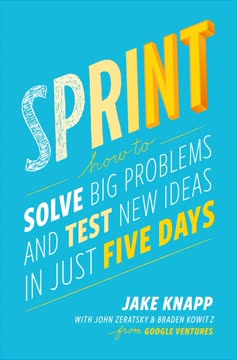Key Takeaways
1. Exponential Organizations (ExOs) leverage new technologies to achieve 10x better performance
An Exponential Organization (ExO) is one whose impact (or output) is disproportionally large—at least 10x larger—compared to its peers because of the use of new organizational techniques that leverage accelerating technologies.
Disruptive impact. ExOs are transforming industries by harnessing the power of information and technology. Unlike traditional companies that rely on owning assets and large workforces, ExOs leverage external resources and information-based strategies to achieve exponential growth. Examples include Airbnb disrupting hospitality without owning hotels, and Uber revolutionizing transportation without owning vehicles.
Key characteristics. ExOs typically exhibit:
- Rapid scalability
- Minimal physical assets
- Leveraging of communities and crowds
- Algorithmic decision-making
- Engagement through digital platforms
- Adaptability to change
These organizations are uniquely positioned to take advantage of accelerating technological trends like artificial intelligence, robotics, 3D printing, and biotechnology.
2. The Massive Transformative Purpose (MTP) drives ExOs' vision and growth
"Don't just ask what the world needs. Ask what makes you come alive and go do it. What the world needs is people who have come alive."
Inspirational vision. An MTP is a highly aspirational tagline that drives an ExO's mission and culture. It goes beyond a traditional mission statement by aiming to transform an industry or even the world. Examples include Google's "Organize the world's information" and TED's "Ideas worth spreading."
Benefits of an MTP:
- Attracts and retains top talent
- Aligns employees around a common goal
- Inspires community engagement
- Guides decision-making and strategy
- Creates a sense of meaning and purpose
By focusing on a grand, transformative vision, ExOs can galvanize support from employees, customers, and partners, fueling rapid growth and innovation.
3. ExOs use SCALE attributes to manage abundance externally
"If you are relying on innovation solely from within your company, you're dead."
External focus. SCALE attributes help ExOs leverage external resources and opportunities:
- Staff on Demand: Utilizing flexible workforce
- Community & Crowd: Engaging users and enthusiasts
- Algorithms: Data-driven decision making
- Leveraged Assets: Accessing vs. owning resources
- Engagement: Fostering user interaction and loyalty
Abundance mindset. By tapping into these external factors, ExOs can rapidly scale without the limitations of traditional organizational structures. This approach allows them to adapt quickly to market changes and leverage global talent and resources.
4. Internal IDEAS attributes enable ExOs to execute efficiently
"Culture eats strategy for breakfast."
Operational agility. IDEAS attributes optimize internal processes:
- Interfaces: Connecting external and internal systems
- Dashboards: Real-time performance metrics
- Experimentation: Rapid testing and iteration
- Autonomy: Empowered, self-organizing teams
- Social Technologies: Collaborative tools and platforms
Cultural shift. These attributes foster a culture of innovation, transparency, and adaptability. By implementing IDEAS, ExOs can make faster decisions, respond to market changes more quickly, and empower employees to drive growth and innovation.
5. Information acceleration is disrupting traditional business models
"Software is eating the world."
Digital transformation. As industries become information-enabled, they experience exponential growth in price/performance, disrupting traditional business models. This shift is evident in sectors like photography (film to digital), music (CDs to streaming), and transportation (ownership to ride-sharing).
Implications:
- Marginal costs approaching zero
- Democratization of production and distribution
- Rapid innovation cycles
- Increased competition from unexpected sources
- Need for continuous adaptation and learning
Organizations must embrace this information-centric paradigm or risk becoming obsolete, as seen with companies like Kodak and Blockbuster.
6. Large organizations can adapt by implementing ExO principles
"If you are not disrupting yourself, someone else is."
Strategies for adaptation:
- Transform leadership through education and diversity
- Partner with, invest in, or acquire ExOs
- Create autonomous innovation units at the edge of the organization
- Implement "ExO Lite" principles internally
Balancing act. Large organizations face the challenge of maintaining their core business while adapting to exponential change. Successful companies like GE and Coca-Cola are embracing ExO principles through strategic partnerships, internal innovation labs, and cultural shifts.
7. The role of C-suite executives is evolving in the age of ExOs
"The most important job of an executive is to catalyze innovation."
New imperatives. C-suite roles are being redefined by exponential technologies and business models:
- CEOs must focus on adaptability and external innovation
- CMOs need to leverage real-time data and personalization
- CFOs face disruption from AI and digital payments
- CTOs/CIOs must balance innovation with security
- New roles like Chief Data Officer are emerging
Continuous learning. Executives must stay informed about emerging technologies and their potential impact on their industries. They need to foster a culture of experimentation and be willing to disrupt their own business models before competitors do.
Last updated:
FAQ
What's Exponential Organizations about?
- Focus on New Models: Exponential Organizations by Salim Ismail examines how modern companies use technology and innovative structures to achieve growth rates ten times better, faster, and cheaper than traditional businesses.
- Exponential Organization Definition: It defines an Exponential Organization (ExO) as one with an impact at least 10x larger than its peers, leveraging new organizational techniques and accelerating technologies.
- Implementation Framework: The book provides a framework for building ExOs, detailing external (SCALE) and internal (IDEAS) attributes that contribute to their success.
Why should I read Exponential Organizations?
- Stay Competitive: The book helps readers understand how to adapt to the rapidly changing business landscape, where traditional companies risk being disrupted by agile startups.
- Practical Guidance: It offers actionable insights and a roadmap for creating or transforming an organization into an ExO, relevant for entrepreneurs and executives.
- Modern Dynamics Understanding: Provides a comprehensive view of how technology and community engagement drive innovation and efficiency, essential for anyone in business today.
What are the key takeaways of Exponential Organizations?
- Massive Transformative Purpose (MTP): An ExO must have a clear and inspiring MTP that drives its mission and attracts a community of supporters.
- SCALE and IDEAS Frameworks: Introduces the SCALE (Staff on Demand, Community & Crowd, Algorithms, Leveraged Assets, Engagement) and IDEAS (Interfaces, Dashboards, Experimentation, Autonomy, Social Technologies) frameworks.
- Embrace Experimentation: Organizations should adopt a culture of experimentation and rapid iteration, allowing them to pivot quickly in response to market changes.
What is the Massive Transformative Purpose (MTP) in Exponential Organizations?
- Inspiring Vision: The MTP is the higher, aspirational purpose of an organization that goes beyond profit, aiming to create significant positive change.
- Cultural Movement: A strong MTP generates a cultural movement, attracting a community that shares the same passion and commitment.
- Examples of MTPs: Companies like Google ("Organize the world’s information") and TED ("Ideas worth spreading") exemplify MTPs that inspire and mobilize communities.
What does the SCALE framework entail in Exponential Organizations?
- External Attributes: The SCALE framework consists of five external attributes: Staff on Demand, Community & Crowd, Algorithms, Leveraged Assets, and Engagement.
- Leveraging Resources: Emphasizes utilizing external resources and communities rather than relying solely on internal assets, allowing for greater flexibility and scalability.
- Real-World Applications: Companies like Uber and Airbnb exemplify the SCALE framework by leveraging community resources and technology to disrupt traditional industries.
What does the IDEAS framework entail in Exponential Organizations?
- Internal Attributes: The IDEAS framework includes five internal attributes: Interfaces, Dashboards, Experimentation, Autonomy, and Social Technologies.
- Operational Efficiency: Focuses on creating efficient internal processes that can handle the outputs generated by the SCALE attributes, ensuring effective scaling.
- Examples of Implementation: Companies like Google use dashboards for real-time performance tracking, while Valve operates with high autonomy, allowing teams to self-organize.
How do Exponential Organizations differ from traditional organizations?
- Focus on Innovation: Exponential Organizations prioritize rapid innovation and adaptability, while traditional organizations often rely on established processes.
- Scalability: They leverage technology to scale operations exponentially, whereas traditional organizations typically grow linearly.
- Community-Centric: Engage their communities actively, turning customers into advocates and co-creators, unlike traditional organizations that view customers as passive consumers.
How do ExOs drive engagement according to Exponential Organizations?
- Community Involvement: ExOs leverage community and crowd engagement to generate ideas, validate concepts, and foster loyalty, creating a sense of ownership among users.
- Gamification Techniques: Engagement strategies include gamification, where users are incentivized to participate and contribute, enhancing their connection to the organization.
- Incentive Competitions: Often use incentive competitions to crowdsource solutions and innovations, as seen with the X Prize Foundation.
What are some examples of successful Exponential Organizations mentioned in Exponential Organizations?
- Airbnb: Leveraged community engagement and technology to disrupt the hospitality industry, achieving rapid growth and scalability.
- Tesla: Utilized a clear MTP and innovative technology to revolutionize the automotive industry and promote sustainable energy.
- Google: Implemented a culture of experimentation and data-driven decision-making, allowing for continuous innovation and market leadership.
What is a Minimum Viable Product (MVP) in the context of Exponential Organizations?
- Basic Definition: An MVP is the simplest version of a product that can be released to test assumptions and gather user feedback.
- Rapid Iteration: The goal is to learn quickly from real users, allowing for adjustments and improvements based on actual market needs.
- Foundation for Growth: Developing an MVP helps organizations validate their ideas before investing significant resources into full-scale production.
How can established companies become Exponential Organizations according to Exponential Organizations?
- Adopt ExO Principles: Established companies should embrace principles like defining an MTP and leveraging technology.
- Create Autonomous Teams: Forming small, agile teams that operate independently can foster innovation and reduce bureaucratic inertia.
- Engage with Startups: Partnering with or acquiring startups can provide fresh ideas and technologies that help traditional companies innovate.
What are the best quotes from Exponential Organizations and what do they mean?
- "If you’re not embarrassed by the product when you launch, you’ve launched too late.": Highlights the importance of rapid iteration and market testing, suggesting that waiting for perfection can lead to missed opportunities.
- "The biggest risk is not taking any risk.": Mark Zuckerberg’s quote underscores the necessity of embracing risk and experimentation in a fast-paced business environment.
- "Any company designed for success in the 20th century is doomed to failure in the 21st.": Emphasizes the need for organizations to evolve and adapt to the new realities of the digital age.
Review Summary
Exponential Organizations receives mixed reviews. Many readers find it insightful, offering valuable information on fast-growing companies and future business trends. The book's concepts, like MTP and SCALE/IDEAS frameworks, are praised for their potential to transform organizations. However, some critics find it repetitive, overly long, and lacking depth. Several reviewers note that while the book may be eye-opening for executives unfamiliar with technology trends, it may offer less value to those already well-versed in the field. Overall, it's considered a thought-provoking read on the future of business.
Similar Books










Download PDF
Download EPUB
.epub digital book format is ideal for reading ebooks on phones, tablets, and e-readers.





